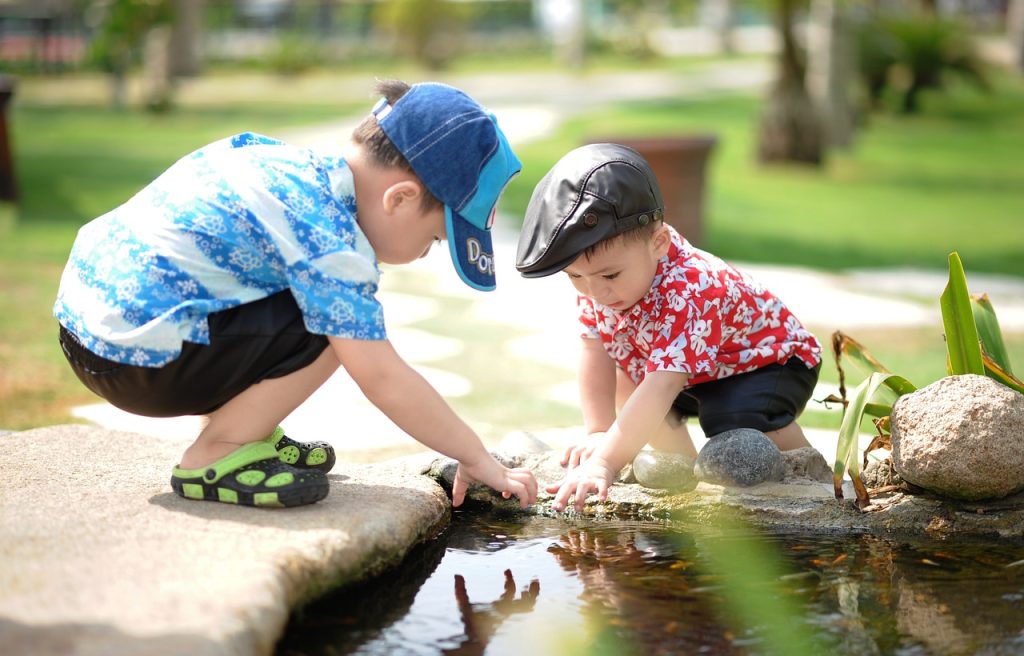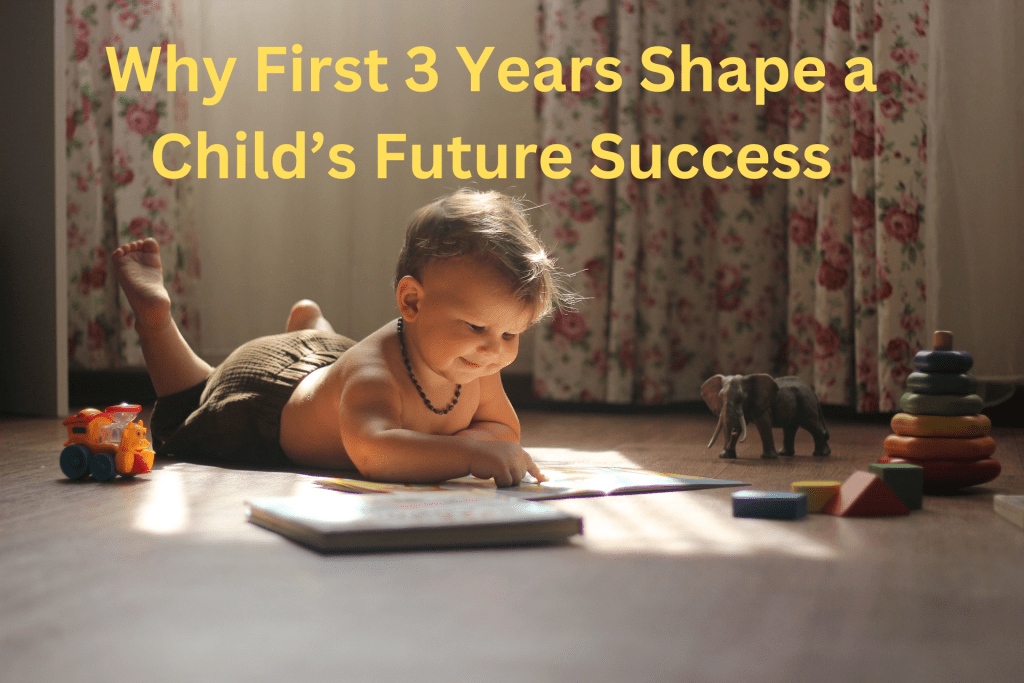The first three years of a child’s life are crucial for brain development and foundational skill-building. During this period, critical connections in the brain are formed that set the stage for future learning, behavior, and health.
Understanding the importance of early childhood development is essential for both parents and educators. These pivotal years are when key social, cognitive, and physical skills begin to emerge, setting the groundwork for a child’s overall development. The rapid brain growth that occurs lays the infrastructure for ongoing mental and emotional maturation.
Children learn to bond, communicate, and explore their environment, which are vital components of their growth. Proper stimulation and nurturing during these formative years increase their potential for success in school and beyond. Ensuring a supportive, enriched, and loving environment can profoundly impact a child’s developmental trajectory, influencing their ability to thrive in the future.
The Early Years: A Foundation For Future Success
The first three years of a child’s life are vital for their future. In this crucial period, the brain grows faster than at any other time. These years shape a child’s ability to learn, think, and relate to others. Building a strong base in the early years can lead to success in school and in life. Let’s look closer at the stages of brain development and the milestones in emotional and social growth.
Critical Brain Development Stages
Connections in a child’s brain multiply during the early years. These connections help with movement, language, and problem-solving. Below is an outline of how a child’s brain evolves:
- Birth to 12 months: The brain creates trillions of connections. Babies learn to trust and form bonds.
- 1 to 2 years: Learning through exploration and play is key. Children start to recognize patterns.
- 2 to 3 years: Language skills explode. Kids begin to understand complex ideas.
Stimulating environments and positive experiences are critical. They help the brain form strong networks. Caregivers play a major role in providing these essentials.
Emotional And Social Milestones
Emotional and social skills are just as important as intellect. They lay the groundwork for relationships and self-esteem.
| Age | Emotional Milestones | Social Milestones |
|---|---|---|
| 0-1 Year | Smiling, fear of strangers | Imitating sounds, responding to names |
| 1-2 Years | Showing affection, sense of self | Playing simple games, recognizing oneself in a mirror |
| 2-3 Years | Expressing a wide range of emotions | Playing with peers, taking turns |
For emotional and social growth, consistent care and positive reinforcement are key. These help children learn to manage their feelings and behave with others.

Parental Influence On Early Childhood
The early years of a child’s life are like the foundation of a house. How strong and supportive this foundation is will affect the whole structure that comes after it. This foundation includes love, support, and learning experiences at home. Parents have a huge role in building this foundation.
Role Of Caregiver Attachment
From birth, children seek comfort and security. A strong bond with caregivers creates a safe base for children to explore the world. This bond supports their social, emotional, and cognitive growth.
- Secure attachments lead to better problem-solving skills.
- Children with trust in their caregivers are more curious and eager to learn.
Impact Of Parenting Styles
Different parenting styles shape a child’s future in unique ways. The way parents interact with their children can influence the child’s personality and behavior.
| Parenting Style | Characteristics | Impact on Child |
|---|---|---|
| Authoritative | Supportive yet firm | Children become confident and self-reliant. |
| Authoritarian | Strict with little warmth | Children may obey but lack self-esteem. |
| Permissive | Warm but undisciplined | Children may struggle with self-control and respect for authority. |
| Uninvolved | Indifferent and unresponsive | Children often have emotional and behavioral difficulties. |
Educational Setting And Future Achievement
Educational Setting and Future Achievement play crucial roles in early childhood development. The right learning environment during these formative years lays the groundwork for future academic success and personal growth.
Benefits Of Early Childhood Education
Quality early education shapes young minds in powerful ways:
- Boosts brain development: Children’s brains grow rapidly, absorbing new information quickly.
- Enhances social skills: Kids learn to share, cooperate, and problem-solve with peers.
- Builds a foundation for learning: Reading, writing, and math skills begin here, setting the stage for academic success.
- Fosters emotional growth: A structured setting offers emotional support and helps children express themselves.
- Encourages curiosity: A stimulating classroom stokes the natural desire to learn and explore.
Long-term Outcomes Of Pre-school Attendance
Attending pre-school brings lasting advantages:
| Outcome | Description |
|---|---|
| Higher Graduation Rates | Children with pre-school education are more likely to graduate from high school. |
| Improved Test Scores | These kids often score higher on standardized tests later in life. |
| Better Social Skills | Interacting early with peers leads to well-adjusted social behaviors. |
| Lower Crime Rates | Studies show early education is linked to decreased crime involvement. |
| Higher Earnings Potential | Early learners tend to earn more as adults, boosting economic success. |
The Significance Of Play In Learning
The first three years of life are a period of incredible growth in all areas of a child’s development. A vital part of that development is learning through play. Play is much more than simple entertainment; it’s the cornerstone of childhood learning that helps establish critical intellectual, social, and emotional foundations.
Play And Cognitive Growth
Children engage with the world around them primarily through play. This key activity stimulates their minds as they explore, think, and understand.
- Problem-solving skills are enhanced as children figure out how to fit blocks into a space or assemble a puzzle.
- Memory is improved as players remember rules and recall past games.
- Language develops when kids communicate during play.
- Concentration is nurtured when engaging in activities that interest them.
Hands-on play with objects like puzzles and building blocks facilitates cognitive development by offering children a tactile understanding of size, shape, and texture.
Social Skills Acquired Through Play
Play teaches children how to interact with others and learn about themselves. They learn valuable life skills that will follow them into adulthood.
| Life Skill | How Play Helps |
|---|---|
| Sharing | Turn-taking and cooperative play encourage sharing. |
| Empathy | Playing roles and understanding feelings teach empathy. |
| Communication | Interactive games foster better communication. |
| Leadership | Group play offers opportunities to lead and organize. |
Make-believe and group games serve as playgrounds for social concepts and roles. Children learn to negotiate, resolve conflicts, and build friendships during play. These social skills are foundational blocks for future relationships.

Language Development And Future Proficiency
The early years of a child’s life are crucial for language acquisition. Between birth and three years of age, a child’s brain grows rapidly, making this period ideal for learning language skills. These skills form the foundation for future communication and education.
Link Between Early Vocabulary And Literacy
Having a rich vocabulary early on can lead to stronger reading and writing abilities later in life. Children who develop a broad range of words tend to read earlier and with more proficiency. Research suggests a strong correlation between vocabulary size at age three and language test scores at ages nine and ten. This link showcases the long-term benefits of early language focus.
Bilingualism And Cognitive Advantages
Children exposed to multiple languages benefit from cognitive advantages. Bilingualism boosts brain functions like problem-solving and multi-tasking. Bilingual children also show enhanced focus and memory skills. Introducing a second language during the first three years taps into the natural language-learning capabilities of children.
Nutrition’s Role In Cognitive Performance
From the moment a child is born, every bite and every sip can shape their growing brain. Child brain development in the first three years sets the stage for how they think, learn, and experience the world. Good nutrition provides the building blocks for an agile mind and lays the tracks for a lifetime of healthy habits. Let’s dive into how diet impacts a child’s cognitive performance.
Diet’s Impact On Brain Development
A child’s diet is like fuel for their brain. The right nutrients help their little neurons connect faster and stronger. Here are key players in a brain-boosting diet:
- Omega-3 Fatty Acids: Found in fish and flaxseeds, they make cell membranes more fluid, helping brain cells talk to each other.
- Iron: This mineral is a cornerstone for growth. It’s crucial for carrying oxygen to the brain, affecting attention span and memory.
- Choline: Found in eggs, it helps form the memory-running part of the brain.
- Zinc: In nuts and whole grains, it helps with brain development and the immune system.
Effects Of Malnutrition On Learning
Missed nutrients mean missed opportunities for learning. Malnutrition can lead to delays in development and long-term learning challenges. Here are some effects of malnutrition:
| Effect | Outcome |
|---|---|
| Limited Energy | Children have less energy for exploring and learning. |
| Delayed Milestones | Skills like language and motor development take longer to emerge. |
| Reduced Concentration | A lack of nutrients affects the ability to focus. |
| Lower School Performance | Poor nutrition is linked to lower grades in school later on. |
In summary, a balanced, nutrient-rich diet early in life is critical. It fuels not just the body but the complex processes within the brain that govern learning, memory and more. Let’s nurture young minds with quality foods for brighter futures.
The Ripple Effect Of Early Childhood Health
The early years of a child’s life set the stage for future health, development, and academic success. Understanding the ‘The Ripple Effect of Early Childhood Health’ is essential. Like a pebble thrown into a pond, early health can create waves that extend far into a child’s future. Building a strong foundation in these years is crucial.
Importance Of Preventive Health Care
Regular check-ups and vaccinations are key in these early stages. They keep children safe from preventable diseases. Proper nutrition and exercise are also part of preventive care. These habits boost a child’s immune system and development.
- Milestone tracking ensures kids are on the right path.
- Dental visits prevent tooth decay, which can affect eating and speaking.
- Sleep patterns set in these years impact overall well-being.
Childhood Health Issues And Long-term Consequences
Issues like obesity, asthma, or hearing and vision problems can start early. They have lasting effects if not addressed.
Table 1: Examples of Early Health Issues and Potential Long-term Consequences
| Early Health Issue | Potential Long-term Consequence |
|---|---|
| Obesity | Heart disease, diabetes, self-esteem issues |
| Asthma | Limited physical activity, frequent hospital visits |
| Hearing loss | Delays in speech and language development |
| Vision problems | Challenges in learning and social interactions |
With early detection and intervention, children can overcome these challenges. This helps them lead healthier, more fulfilling lives.
Inequality In Early Childhood And Its Long-term Effects
The early years of a child’s life set the trajectory for their future growth and achievements. Recent studies highlight a stark reality: not all children have the same starting line. Inequality in early childhood can lead to profound long-term effects, with children from disadvantaged backgrounds often facing uphill battles in education, health, and social mobility. Recognizing this challenge is crucial to fostering a fairer society.
Disparities In Access To Resources
From the moment children are born, the resources available to them can vary greatly. Children from affluent families often have access to a wealth of resources. These include quality education, nutritious food, and enriching experiences. On the other hand, children from less privileged backgrounds may face a shortage of these critical assets. This imbalance can affect cognitive development, social skills, and emotional well-being. Let’s explore the impact of these disparities:
- Educational Tools: Books and educational toys that stimulate the mind are more abundant in wealthy households.
- Healthcare: Access to healthcare ensures early detection and treatment of developmental issues.
- Nutritional Food: A balanced diet is vital for brain development and overall health.
Strategies To Mitigate Inequality
Addressing inequality is essential for ensuring all children can reach their full potential. Several strategies can be implemented to level the playing field:
- Early Intervention Programs: These programs provide support to children and families in need.
- Policy Reforms: Governments can enact policies to improve access to early childhood education and healthcare.
- Community Support: Local communities can offer resources and services to support families.
| Resource | Impact on Child Development | Strategies for Improvement |
|---|---|---|
| Educational Toys | Stimulates cognitive growth | Donate toys to community centers |
| Healthcare Access | Ensures physical and mental health | Expand public health services |
| Nutrition | Supports brain development | Implement school meal programs |
Policies That Can Shape Early Childhood Outcomes
The first years of a child’s life are the foundation for their future development. They are crucial for learning, and emotional growth. The policies created during this sensitive period can greatly influence early childhood outcomes. Well-crafted policies provide support structures for families and set the stage for successful childhood programs.
Governmental Support For Families And Children
Government policies can help families. They give resources to parents. And they create a secure environment for kids. Financial aid, parental leave, and healthcare access are examples.
- Subsidies for childcare ease financial strain.
- Maternity and paternity leaves let parents bond with newborns without losing income.
- Healthcare policies ensure children receive necessary medical checks and vaccinations.
These supports help children develop in a healthy way. They also prepare them for school.
Success Stories In Early Childhood Programs
High-quality early childhood programs have proven successful. They provide learning and social experiences. Kids who attend them do better in school. They also have better social skills.
| Program Name | Impact |
|---|---|
| Head Start | Improved educational outcomes |
| Early Head Start | Development gains in language and social domains |
Stories from these programs show how policy investment pays off in children’s futures. Seeing these benefits, governments are motivated to keep investing.
Conclusion: Investing In The Early Years
The first three years of a child’s life are not just important; they are essential. The investment we make during this period lays the groundwork for their future health, happiness, growth, and development. Focusing on early childhood development is one of the most effective ways to create a strong society.
Summary Of Key Points
Brain Development: A child’s brain grows fastest during the first three years, forming neural connections at a phenomenal rate.
Emotional and Social Skills: Early experiences set the stage for developing empathy, confidence, and self-esteem.
Cognitive Abilities: Interaction with parents and caregivers spurs cognitive development and learning.
Language Skills: Vocabulary begins to explode as toddlers learn new words daily.
Physical Growth: Proper nutrition and activity in these years are critical for healthy body development.
Call To Action For Future Generations
We have a collective responsibility to nurture young minds. Parents, caregivers, and communities must prioritize investment in our youngest citizens. By doing so, we shape a brighter future.
- Support Families: Ensure parents have the resources they need.
- Quality Childcare: Provide access to high-quality early learning environments.
- Community Engagement: Foster a community that supports early childhood development.
- Policy Advocacy: Encourage policies that promote the well-being of children.
Join hands to make the early years count. Your action today influences our world tomorrow.
Frequently Asked Questions Of Why Are The First 3 Years Important To A Child’s Development
What Is The Significance Of Early Childhood Development?
Early childhood development lays the foundation for lifelong learning, behavior, and health. These initial years are when critical brain structures and pathways form. As such, early experiences and nurturing significantly influence a child’s future cognitive, social, emotional, and physical development.
How Do The First 3 Years Affect Brain Growth?
During the first three years, a child’s brain undergoes rapid growth, reaching up to 90% of adult size. This period is characterized by the formation of neural connections at an unprecedented rate, which are greatly influenced by environmental stimuli and interactions, shaping the brain’s architecture.
What Milestones Should A Child Reach By Age 3?
By age 3, children should reach key developmental milestones across several domains: they usually can speak in short sentences, walk and climb with improved coordination, show basic social skills, and exhibit a vivid imagination. These milestones are indicators of proper development and can signal any potential issues.
Why Is Parental Involvement Crucial In Early Years?
Parental involvement is crucial as it fosters emotional security and supports learning. Engaged parents help to establish a safe and stimulating environment. Responsive interactions, such as talking, playing, and reading, are vital for promoting brain development and nurturing skill acquisition.
Conclusion
Understanding early childhood development is crucial. The first three years set the stage for lifelong learning, behavior, and health. Parents, caregivers, and educators play key roles in shaping a child’s future. By nurturing cognitive, social, and emotional growth, we ignite a child’s potential.
Let’s commit to enriching these pivotal years for every child’s journey.

